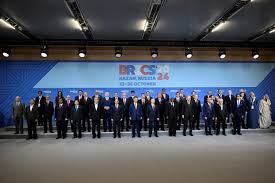Despite growing tension and recent provocations from the U.S., the BRICS grouping — Brazil, Russia, India, China, and South Africa is far from ‘dead.’ While US President Donald Trump has repeatedly threatened tariffs and criticized the group’s potential push for a common currency, experts argue that these concerns do not signal the collapse of the multilateral alliance.
Trump’s Rhetoric and BRICS Future
Trump has been vocal about the growing efforts of BRICS nations to challenge the global dominance of the U.S. Dollar. The possibility of BRICS adopting a common currency, often referred to as part of a ‘dedollarization’ agenda, has raised alarms in Washington. Trump has gone so far as to threaten a 100 percent tariff on BRICS member nations should they move forward with this plan, accusing the group of attempting to undermine the US Dollar’s supremacy in global trade.
While these threats have drawn considerable attention, Dr Aparaajita Pandey, expert on Strategic Affairs, and a Ph.D. scholar from Jawaharlal Nehru University, New Delhi, stresses that while Trump’s rhetoric is intense, it’s essential to understand the underlying intent rather than taking his statements literally. “It’s important not to take Trump’s words at face value. His intention is clear: to prevent the Yuan, or any other currency, from replacing the US Dollar as the dominant currency in international trade,” Dr Pandey explained.
BRICS Currency: A Non-Starter?
While a common BRICS currency has been a point of debate within the group, it’s not an issue that has widespread support among its members. As reportedly previously by FinancialExpress.com, India, for instance, has constantly expressed unwillingness toward the idea of a BRICS currency, fearing potential disruptions to its own economic interests.
Moreover, countries within the bloc already engage in a significant amount of trade using the Chinese Yuan, especially China’s bilateral relations with BRICS members. However, this doesn’t indicate that BRICS is on the brink of collapse. “Even without a common currency, BRICS continues to serve its purpose as a platform for economic cooperation among developing nations,” Dr Pandey noted.
BRICS, much like its early years, continues to be a forum for member countries to discuss and advocate for their collective interests, even if the currency discussion falters. The New Development Bank (NDB), established by BRICS to fund infrastructure projects in emerging markets, remains a significant part of the group’s ongoing work.
Why BRICS Still Matters to India
For India, BRICS is not just about economic cooperation but also part of its broader strategy to assert its influence in a rapidly changing world order. While some Western analysts perceive BRICS as an anti-Western coalition, it’s important to note that the group is fundamentally non-Western, not necessarily hostile to the West.
“BRICS is about securing the economic interests of non-Western countries. It offers India access to strategic markets, including Central Asia, the Middle East, and Africa,” said an expert on Indian foreign policy. As India positions itself as a leader of the Global South, BRICS serves as a valuable platform to challenge the dominance of Western powers and institutions that have historically shaped global economic and political systems.
Moreover, the growing presence of nations like Egypt, Iran, and the UAE in BRICS underscores the group’s role as a significant player in global trade and diplomacy. India sees BRICS as a valuable economic gateway, offering access to diverse markets and opportunities. The expansion of BRICS to include new members, like Saudi Arabia, which is still in the process of joining, further enhances the grouping’s relevance.
Is BRICS Really on the Verge of Collapse?
While a shared currency may not materialize anytime soon, BRICS remains a vital platform for promoting the interests of its member states, including India.
The key takeaway is that BRICS is not about to collapse just because of failed currency discussions or external pressures. In fact, it serves as an essential pillar of India’s broader multilateral strategy. As the US focuses on bilateral agreements and moves away from multilateral frameworks, BRICS and other international coalitions become increasingly important for India to secure its economic and strategic interests.


